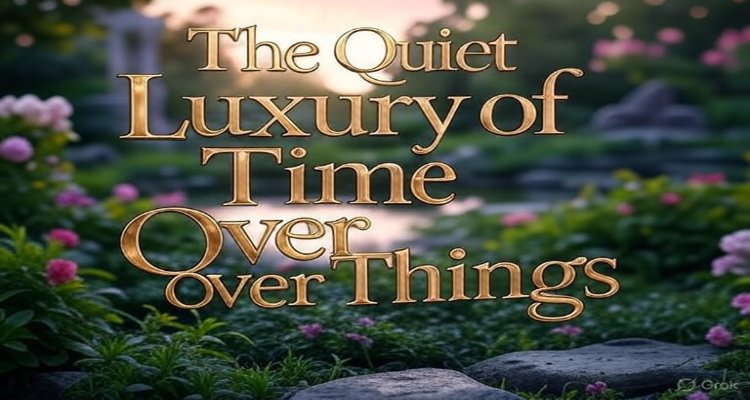The Quiet Luxury of Time Over Things

In an age of material excess, the greatest luxury is no longer possessions but time—uninterrupted, unhurried, and deeply human.
Introduction: The New Gold Standard of Luxury
For centuries, wealth was measured in possessions—ornate mansions, fine jewelry, and expensive cars. But as modern life accelerates with endless digital notifications, back-to-back schedules, and consumer temptations, a quieter truth has emerged: the most coveted luxury is not material, but temporal. Today, the ability to step away from constant busyness, reclaim personal hours, and savor meaningful experiences has become the ultimate marker of privilege.
Context & Background: From Material Wealth to Experiential Value
The concept of “quiet luxury” has gained traction in fashion and lifestyle, often referring to understated elegance over flashy displays. Yet beyond clothing and aesthetics, this philosophy now extends to life itself. Economists and sociologists note a cultural shift—particularly among younger generations—toward valuing time, experiences, and balance over accumulation of things.
Historically, luxury brands marketed exclusivity through physical goods. But as people grow weary of clutter and the environmental costs of overconsumption, the pendulum swings toward immaterial wealth: free evenings, vacations without emails, and weekends free from obligation.
Main Developments: Why Time Has Surpassed Things
Several forces have contributed to this redefinition of luxury:
- Digital Saturation: With smartphones tethering people to work and social media 24/7, uninterrupted time feels rare and precious.
- Post-Pandemic Reevaluation: The COVID-19 crisis reminded people of life’s fragility, sparking a global movement to prioritize health, family, and balance.
- Wealth Disparity: In today’s economy, even high earners often trade long hours for material wealth, highlighting that time is a resource not equally available.
- Minimalist Movements: Rising interest in minimalism, slow living, and sustainability underscores a societal shift away from consumerist definitions of success.
In short, the wealthiest are not those with the most possessions, but those who can afford to slow down.
Expert Insight & Public Sentiment
Psychologists argue that time wealth—control over one’s schedule—directly correlates with happiness. “Research consistently shows that people who prioritize time over money experience greater life satisfaction,” notes Dr. Ashley Whillans, a behavioral scientist at Harvard Business School.
Meanwhile, cultural analysts point to the rise of wellness retreats, digital detox programs, and even companies offering “quiet luxury” travel packages where the focus is seclusion and rest rather than opulence. Public sentiment, too, increasingly favors stories of individuals leaving high-pressure jobs to pursue balance, freedom, or creative fulfillment.
Impact & Implications: A Redefinition of Success
This reimagining of luxury has ripple effects across industries:
- Corporate Culture: Employers face growing pressure to support work-life balance through flexible schedules and remote work.
- Travel & Leisure: Tourism is shifting from bucket-list destinations toward mindful escapes that prioritize stillness and disconnection.
- Luxury Goods Market: Brands are subtly rebranding themselves around timelessness and quality experiences rather than ostentation.
On a personal level, the embrace of time over things encourages individuals to question: Am I living to work, or working to live?
Conclusion: The Timeless Treasure
The quiet luxury of time cannot be bought in a store or displayed on a wrist—it must be claimed, protected, and cherished. In an era where distraction and consumerism dominate, choosing to value moments over merchandise represents not just a lifestyle choice, but a cultural shift. True wealth lies in the ability to pause, breathe, and spend our most finite resource—time—on what matters most.
Disclaimer : This article is for informational purposes only and reflects cultural and lifestyle analysis. It does not constitute financial or psychological advice.










